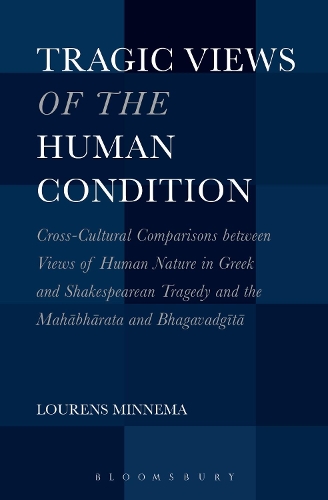
Tragic Views of the Human Condition: Cross-Cultural Comparisons between Views of Human Nature in Greek and Shakespearean Tragedy and the Mahabharata and Bhagavadgita
(Paperback)
Publishing Details
Tragic Views of the Human Condition: Cross-Cultural Comparisons between Views of Human Nature in Greek and Shakespearean Tragedy and the Mahabharata and Bhagavadgita
By (Author) Prof. Lourens Minnema
Bloomsbury Publishing PLC
Bloomsbury Academic USA
22nd October 2015
United States
Classifications
Tertiary Education
Non Fiction
Hinduism
202.2
Physical Properties
Paperback
584
Width 152mm, Height 229mm
898g
Description
Can tragic views of the human condition as known to Westerners through Greek and Shakespearean tragedy be identified outside European culture, in the Indian culture of Hindu epic drama In what respects can the Mahabharata epic's and the Bhagavadgita's views of the human condition be called tragic' in the Greek and Shakespearean senses of the word Tragic views of the human condition are primarily embedded in stories. Only afterwards are these views expounded in theories of tragedy and in philosophical anthropologies. Minnema identifies these embedded views of human nature by discussing the ways in which tragic stories raise a variety of anthropological issuesissues such as coping with evil, suffering, war, death, values, power, sacrifice, ritual, communication, gender, honour, injustice, knowledge, fate, freedom. Each chapter represents one cluster of tragic issues that are explored in terms of their particular (Greek, English, Indian) settings before being compared cross-culturally. In the end, the underlying question is: are Indian views of the human condition very different from Western views
Reviews
This book represents a new kind of scholarly Comparative World Literature for a new kind of global, multicultural readership. It is writing like this, elegant, eloquent and judicious, that contributes to the formation of a shared literary and critical canon. Minnema focuses first on the stories in which views of human nature are embedded and only then on the philosophical and theological theories that derive from them. His ability to move between literary, philosophical and theological discussion provides a masterly example of interdisciplinarity. * Michael McGhee Honorary Senior Fellow, Department of Philosophy, University of Liverpool, UK *
In this multi-faceted and comprehensive study, Lourens Minnema explores subject-matter of wide appeal: tragedy and human nature. The reader is immediately engaged by a direct and accessible style, and will benefit from a wealth of absorbing detail and stimulating analysis. This work is a successful demonstration of the value, scope and potential of cross-cultural comparison. * Martin Ovens, Philosophy Tutor, Member of Wolfson College, University of Oxford, UK *
Minnema forges a powerful way to bring textual traditions from Eastern and Western cultures into dialogue and mutual edification. Erudite and insightful, Minnema makes real contributions to philosophy, literature, philology by restoring to the human sciences the most important questions concerning humanity. This is the most original reading of the Bhagavad-Gita in the last few decades. Minnema avoids the mind-numbing mechanics of text-historical methods and bravely asks intelligent questionsquestions these texts themselves grapple with, not questions generated in academic laboratories. This book is a pleasure to read. * Vishwa Adluri, Adjunct Assistant Professor in Religion and Philosophy, Hunter College, The City University of New York, USA *
This is an extraordinary work of comparative literature studying the depiction of human tragedies from the Eastern and Western perspectives. The author takes the Mahabharata and the Bhagavadgita as samples of the Eastern stand on tragedy and compares it with the Greek and Shakespearean literature. This in-depth analysis shows that the very meaning of the word tragedy changes considerably between these cultures. The narrative, artistic, communicative, social, political, literary, cultural, martial, psychological, ethical, and religious aspects of tragedy are dealt with. The thoroughness of the work is simply amazing and invites the reader to look at tragedy from an informed perspective. This book is a handy reference for all students of comparative literature. * Prabuddha Bharata *
This ambitious study explores, in nine chapters, a wide range of aspects of tragedy in ancient India, Greece, and Shakespeare. It is marked throughout by deep scholarship and sensitivity to cross-cultural and historical differences Most fascinating is chapter 7, 'Psycho-Ethical Aspects,' which compares the psychic conflicts, moral dilemmas, pursuit of self-knowledge, and types of wrongdoing in the three tragic traditions Summing Up: Highly recommended. Upper-division undergraduates through researchers/faculty. -- J. Bussanich, University of New Mexico * CHOICE *
Author Bio
Lourens Minnema is Senior Lecturer in Religious Studies in the Department of Philosophy of Religion and Comparative Study of Religions at VU University, Amsterdam, The Netherlands.
